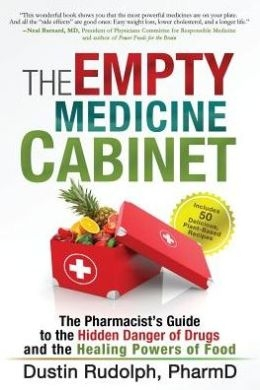The Empty Medicine Cabinet
The Pharmacist's Guide to the Hidden Danger of Drugs and the Healing Powers of Food
A pharmacist cautions against the overuse of prescription medications, advocating a significant change in diet to prevent and treat major health problems.
The Empty Medicine Cabinet: The Pharmacist’s Guide to the Hidden Danger of Drugs and the Healing Powers of Food, by Dustin Rudolph, a practicing pharmacist, is a well-researched proposal in favor of the benefits of a plant-based diet to prevent and treat a host of diseases. It promotes a “lifestyle medicine” approach, looking to food rather than conventional medicine, specifically prescriptions, to solve medical issues. From heart disease and diabetes to obesity, cancer, and autoimmune disorders, Rudolph presents a convincing argument calling for a focus on diet and exercise.
Rudolph suggests a solution to medical issues that addresses potential underlying causes of illness and disease caused by diet. Instead of trendy diet plans, a whole-foods, vegan diet free of processed foods and refined sugar and carbs is recommended, both for weight loss and disease prevention. In the process, myths about a plant-based diet potentially leading to malnutrition or vitamin and nutrient deficiencies are systematically dispelled. Easy-to-follow recipes are included, using a variety of ingredients found in nearly all American supermarkets today.
Sharing stories of his childhood spent on his grandfather’s farm in Montana, these early influences, along with his medical training and professional experiences, provide Rudolph a unique perspective on the benefits of a natural lifestyle. The overall argument is counter to what most would expect from a pharmacist. Concerned about an overreliance on prescriptions, Rudolph makes an argument that is convincing because he is speaking from firsthand knowledge about what he sees as overuse.
Medical information is detailed and technical but described in a way that is accessible to a general audience. Visual aids, such as charts, present the information clearly and highlight key points. Claims are well documented and supported with a range of sources, lending credibility. First- and third-person accounts from patients who adopted a lifestyle-medicine approach with much success offer additional perspectives. In addition to the practical information that can be applied individually every day, a discussion about the lack of training on nutrition in medical schools speaks to larger issues and the changes needed to make lifestyle medicine a more common, socially acceptable approach.
Encouraging Americans to rethink what is considered a so-called normal American diet, the path to the “empty medicine cabinet” suggested requires significant lifestyle changes, but with potentially significant results.
Reviewed by
Maria Siano
Disclosure: This article is not an endorsement, but a review. The publisher of this book provided free copies of the book to have their book reviewed by a professional reviewer. No fee was paid by the publisher for this review. Foreword Reviews only recommends books that we love. Foreword Magazine, Inc. is disclosing this in accordance with the Federal Trade Commission’s 16 CFR, Part 255.

